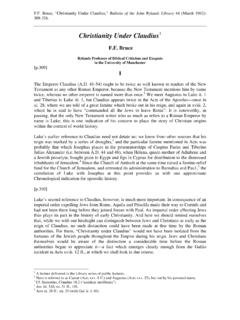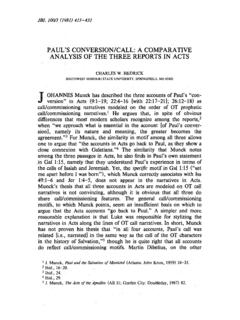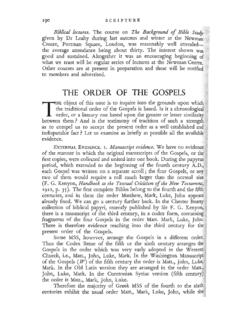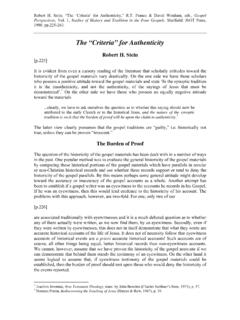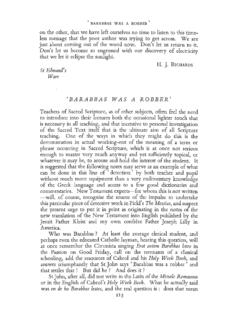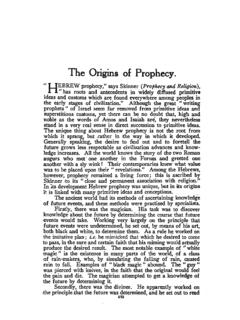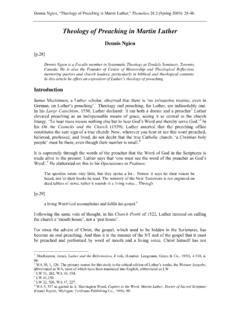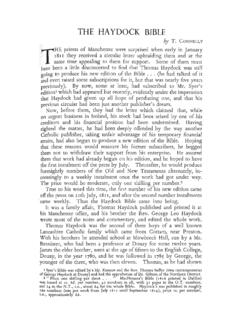Transcription of Does Kefalh (“Head”) Mean “Source” Or “Authority …
1 Wayne Grudem, Does Kefalh ( Head ) Mean Source Or authority over in Greek Literature? A Survey of 2,336 Examples, Trinity Journal ns (Spring 1985): 38-59. Does Kefalh ( Head ) Mean Source Or authority over in Greek Literature? A Survey of 2,336 Examples* Wayne Grudem Trinity Evangelical Divinity School [ ] (One of the sensitive issues currently being discussed in many churches and seminaries is what the Bible has to say about women. So much has been written on this subject during the past decade that it is now becoming difficult to find anything new or fresh or challenging: positions are becoming hardened, justified by the same arguments someone else has already advanced, without close and humble examination of the validity of those arguments.)
2 Dr. Grudem s article breaks that mold: his essay examines an enormous quantity of primary data to provide some controls in establishing the meaning of head and headship in the New Testament and as a result he demonstrates convincingly that one major strand of modern interpretation, repeated from book to book, is simply wrong. Because of the primary nature of this research, we have decided to publish his essay here, even though it is simultaneously being published as an appendix to the new edition of George Knight s The Role Relationship of Men and Women, published by Moody Press.
3 Ed.) When the New Testament says that the head of every man is Christ and the head of a woman is the man (1 Cor 11:3), or that the husband is the head of the wife as Christ is the head of the church (Eph 5:23), Christians have usually understood the word head to mean authority over . Thus, Christ is the authority over the church and a husband is the authority over his wife. But that viewpoint has been challenged recently by those who claim, at least for some passages, that the word head means source or origin rather than authority over .
4 Thus, Christ is the source of every man, Christ is the source of the church, and referring to Adam and Eve the man is the source of the woman. It is the purpose of this appendix to examine that recent claim on the basis of a survey of more than 2,300 examples of the Greek word ( head ) from ancient Greek literature. Arguments in Favor of the Meaning Source Modern Authors Perhaps the most influential and explicit statement of the position that [ ] means source was the article, Does Male Dominance Tarnish Our Translations?
5 By Berkeley and Alvera Mickelsens argued that head in Greek usage does * Reprinted from the appendix of The Role Relationship of Men and Women, by George W. Knight III. Copyright 1977,1985 by George W,: Knight III. Used by permission of Moody Press. 1 Berkeley Mickelsen and Alvera Mickelsen, Does Male Dominance Tarnish Our Translations? Christianity Today, 5 October 1979, pp. 23-29. (See also their article, The Head of the Epistles, Christianity Today, 20 February 1981, pp.)
6 20-23.) Wayne Grudem, Does Kefalh ( Head ) Mean Source Or authority over in Greek Literature? A Survey of 2,336 Examples, Trinity Journal ns (Spring 1985): 38-59. not mean boss or final authority , but that a common meaning was source, or origin, as we use it in the head of the Mississippi River ( ). They suggested the meaning source for the word head in 1 Corinthians 11:3 and Colossians 1:18. Other writers make similar claims. Regarding 1 Corinthians 11:3, Margaret Howe states, The word head here must be understood not as ruler but as source.
7 Christ came from God; he is the only Son from the Father (John 1:14). As the agent of creation (John 1:3), Christ brought the man into and from the male of the species, the female came into being (Gen 2:21 22).2 Letha Scanzoni and Nancy Hardesty say, kephale is used almost synonymously with arche, beginning, somewhat similar to our use of the headwaters of a river or fountain head. Thus, when Ephesians 5:23 says Christ is the head of the church, his body, they take it to mean that He is the church s lifegiver.
8 And when Colossians 2:10 calls Christ the head of all rule and authority , Scanzoni and Hardesty say, Head here obviously means source. Similarly, Christ s headship over the chruch refers to his being the source of its life. 3 Richard and Joyce Boldrey apparently support this interpretation when they say of 1 Corinthians 11, When Paul spoke of woman s head being the man, he was emphasizing man s temporal priority and woman s derivation from him. 4 The foregoing authors represent what we may call a Christian feminist perspective; others who do not generally endorse the Christian feminist position have also supported this view of.
9 Commenting on 1 Corinthians 11:3, F. F. Bruce writes, By head in this context we are probably to understand not, as has frequently been suggested, chief or ruler but rather source or origin a sense well attested for Greek . Similarly, C. K. Barrett says, In Greek usage the word, when metaphorical, may to That this is the sense of the word here is strongly suggested by verses 8f. Colin Brown says of 1 Corinthians 11:3, Here head is probably to be understood not as chief or ruler but as source, or origin. And James Hurley, although retaining the sense authority over in 1 Corinthians 11:3, allows the meaning source in Colossians 2:19 and Ephesians 4:15.
10 He says, In English we speak of the head of a river to refer to its point of origin. This was a typical usage of head ( ) in classical In Paul s day, therefore, the Greek word head ( ) could mean a physical head, a person with authority , or the source of something. Head ( ) was used in first-century Greek as a synonym for the more common words for ruler ( rcwn) and for source ( rc ). 5 [ ] Summary of evidence supporting the meaning source The repeated claim by these authors is that source was a commonly known or easily recognized sense of the word head ( ) for the Greek-speaking readers of Paul s epistles.
